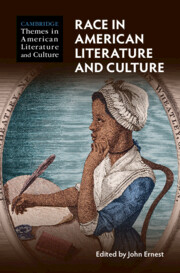Book contents
- Race in American Literature and Culture
- Cambridge Themes in American Literature and Culture
- Race in American Literature and Culture
- Copyright page
- Contents
- Contributors
- Acknowledgments
- Introduction
- Part I Fractured Foundations
- Part II Racial Citizenship
- Part III Contending Forces
- Part IV Reconfigurations
- Chapter 10 Passing
- Chapter 11 Beyond Assimilation
- Chapter 12 Native Reconfigurations
- Chapter 13 Dispossessions and Repositionings
- Chapter 14 “White by Law,” White by Literature
- Part V Envisioning Race
- Part VI Case Studies
- Part VII Reflections and Prospects
- Index
Chapter 14 - “White by Law,” White by Literature
Naturalization and the Constructedness of Race in the Literature of American Naturalism
from Part IV - Reconfigurations
Published online by Cambridge University Press: 26 May 2022
- Race in American Literature and Culture
- Cambridge Themes in American Literature and Culture
- Race in American Literature and Culture
- Copyright page
- Contents
- Contributors
- Acknowledgments
- Introduction
- Part I Fractured Foundations
- Part II Racial Citizenship
- Part III Contending Forces
- Part IV Reconfigurations
- Chapter 10 Passing
- Chapter 11 Beyond Assimilation
- Chapter 12 Native Reconfigurations
- Chapter 13 Dispossessions and Repositionings
- Chapter 14 “White by Law,” White by Literature
- Part V Envisioning Race
- Part VI Case Studies
- Part VII Reflections and Prospects
- Index
Summary
Just like racial difference, whiteness is a social construct. The paradox of race and of whiteness is that white or nonwhite skin color means nothing in itself; rather, what matters is the social meaning that is ascribed to these differences in color. This essay examines the way whiteness has historically been constructed in both law and literature. Exploring the parallel between legal and literary histories, it refers to the literature of naturalism – Frank Norris’s The Octopus and Stephen Crane’s Maggie – as well as to the racial prerequisite cases, in which immigrants had to prove they were white and hence eligible for naturalization. In law as much as in literature, whiteness is far from homogenous, but instead seems to be eclipsed into infinite shades of whiteness. At the same time, in both literature and law, whiteness is not only linked to skin color, but to culture as well. In Crane’s novella, the cultural compatibility of the Irish is seen as dubious at best. Similarly, the Chinese cook in Norris’s novel is portrayed as culturally alien and hence as unassimilable. This essay proposes that the potential whiteness of immigrant groups is being contested in both the court of law and that of literature.
Keywords
- Type
- Chapter
- Information
- Race in American Literature and Culture , pp. 225 - 238Publisher: Cambridge University PressPrint publication year: 2022

